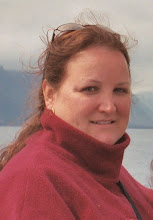After visiting Earth University’s sustainable farms, we were off to the “home stays”. This is the first time that Toyota does this part of the trip and our directors were anxious to hear about our experiences. There were five teachers in my group.
The bus ride there was a challenge as we were climbing steep hills with dirt roads in worse condition than ANY potato field road I’ve ever seen. We’re talking BIG rocks and MAJOR potholes. I don’t think they have ever passed a grader on the road, either because the communities don’t have one or because the road gets destroyed during the wet season. Even walking in these very narrow roads is a challenge.
Anyway, my home stay was at a cacao farm called Finca La Virgen (The Virgin Farm). We were greeted by Chipita, an elderly woman who is trying to organize her eco-tourist business by letting travelers stay with her and learn about the process of cultivating cacao, which is the bean used to make chocolate.
 Chipita’s home was very modest: no windows just chicken wire with shutters, cement floor, wood board walls with daylight (or twilight!) cracks, and a very small, ancient cast iron wood stove on the porch for cooking. Chipita did have a refrigerator, but that was about the only convenience.
Chipita’s home was very modest: no windows just chicken wire with shutters, cement floor, wood board walls with daylight (or twilight!) cracks, and a very small, ancient cast iron wood stove on the porch for cooking. Chipita did have a refrigerator, but that was about the only convenience. We had all of our meals at her son’s home, just 20 or so feet away. Fernando, the son, was actually our bus driver (so he knew the road and every obstacle!). His house was much more modern, painted stucco, nice tile floors, flat screen TV, modern appliances, etc.
 That is the difference between someone who drives for Earth University and someone who is trying to make a living with a small farm. Chipita, Fernando, Bibianne (wife) and Yorkin (son, spelled phonetically) were very welcoming and tried to make their five guests as comfortable as possible. Chipita gave us a lesson on how to make tortillas, which we ate with the dinner Bibianne had prepared for us.
That is the difference between someone who drives for Earth University and someone who is trying to make a living with a small farm. Chipita, Fernando, Bibianne (wife) and Yorkin (son, spelled phonetically) were very welcoming and tried to make their five guests as comfortable as possible. Chipita gave us a lesson on how to make tortillas, which we ate with the dinner Bibianne had prepared for us.
After dinner Saturday night, we played a game with Yorkin, trying to teach him a few English words. Luckily for us, one of the teachers, Karenina, originally from Mexico but now living in Missouri, translated the entire time of the home stay. We shared pictures of our homes, families, and schools, and Chipita just kept saying that she wanted to visit each one of us, but besides the cost, getting a Visa to come to the US was very difficult.

I went to bed that night, dressed in my clothes and wrapped in a bed sheet, as there were may bugs in Chipita’s house. I had also brought Wet Ones (small towelettes) because I knew that bathroom facilities might be limited.
In the morning, we started visiting Chipita’s farm. She had all kinds of fruit trees: bananas, star fruit, oranges, coconuts, guava, but her farm was mostly cacao trees on a hillside. We learned about the various species of cacao, the growing season, how to collect the seeds, ferment them, dry them, and roast them. Chipita made hot chocolate for us and prepared chocolate “candy”. She then showed us how she packages the product to sell. I’m happy to say that the five teachers staying at Chipita’s stimulated the economy in that part of the world—she was very happy to have sold some of her cacao, nicely packaged in banana paper with a hand-painted logo.
We also planted several cacao trees in Chipita’s plantation. She told us that she would never forget her new friends because she would have the trees to remind her.




No comments:
Post a Comment